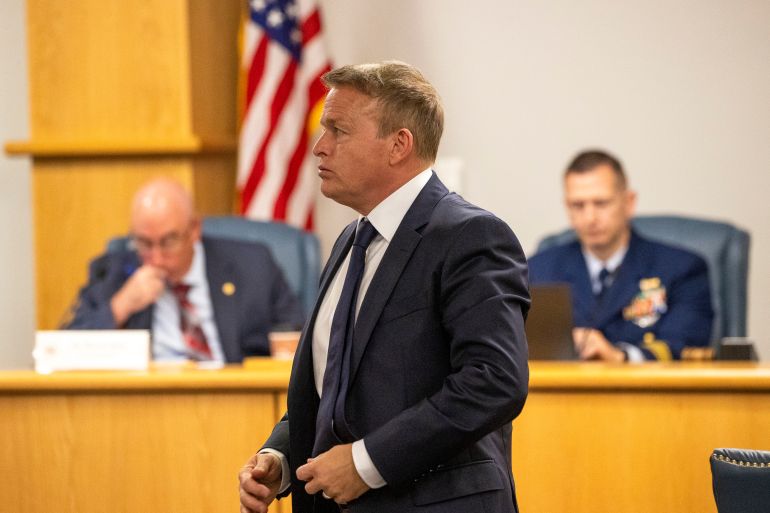Titan implosion could have been prevented, says OceanGate ex-director
David Lochridge references a 2018 report in which he raised safety issues about OceanGate’s operations.
Former OceanGate’s director of marine operations, David Lochridge, centre, during his testimony [Andrew J Whitaker/AP Photo]Published On 18 Sep 202418 Sep 2024
A key employee who labelled the experimental Titan submersible unsafe before its last, fatal voyage has said the tragedy could have been prevented if a federal safety agency of the United States had investigated his complaint.
David Lochridge, OceanGate’s former operations director, said he felt let down by the Occupational Safety and Health Administration’s decision not to follow up on his complaint.
“I believe that if OSHA had attempted to investigate the seriousness of the concerns I raised on multiple occasions, this tragedy may have been prevented,” he said on Tuesday while speaking before a commission trying to determine what caused the Titan to implode as it made its way to the wreckage of the Titanic last year, killing all five on board.
“As a seafarer, I feel deeply disappointed by the system that is meant to protect not only seafarers but the general public as well,” he added.
Lochridge said during testimony that eight months after he filed the OSHA complaint, a caseworker told him the agency had not begun an investigation and there were 11 cases ahead of his. By then, OceanGate was suing Lochridge and he had filed a countersuit.
About 10 months after he filed the complaint, he decided to walk away. The case was closed and both lawsuits were dropped.
“I gave them nothing, they gave me nothing,” he said of OceanGate.
OSHA officials did not immediately respond to a request for comment on Tuesday.
Earlier in the day, Lochridge said he frequently clashed with the company’s co-founder and felt the company was committed only to making money.
Lochridge was one of the commission’s most anticipated witnesses. His testimony echoed that of other former employees who had spoken on Monday, one of whom described OceanGate boss Stockton Rush as volatile and difficult to work with.
“The whole idea behind the company was to make money,” Lochridge said. “There was very little in the way of science.”
OceanGate’s submersible vessel, Titan [OceanGate Expeditions via AP]
OceanGate faced pressure to launch Titan quickly
Rush was among the five people who died in the implosion. OceanGate owned the Titan and had used it on several dives to the Titanic going back to 2021.
The commission has heard testimony painting a picture of a troubled company that was impatient to get its unconventionally designed craft into the water. The accident set off a worldwide debate about the future of private undersea exploration.
Lochridge joined OceanGate in the mid-2010s as a veteran engineer and submersible pilot and said he quickly came to feel he was being used to lend the venture scientific credibility. He said he felt the company was selling him as part of the project “for people to come up and pay money”, and that did not sit well with him.
“I was, I felt, a show pony,” he said. “I was made by the company to stand up there and do talks. It was difficult. I had to go up and do presentations. All of it.”
Lochridge referenced a 2018 report in which he raised safety issues about OceanGate operations. He said with all of the safety issues he saw “there was no way I was signing off on this”.
Asked whether he had confidence in the way the Titan was being built, he said: “No confidence whatsoever.”
OceanGate, based in Washington state, suspended its operations after the implosion.
OceanGate has faced questions over safety concerns that went ignored as the company pushed efforts to carve out a niche in the world of adventure tourism [OceanGate Expeditions via AP]
Former employee labelled Titan ‘unsafe’
OceanGate’s former engineering director, Tony Nissen, kicked off Monday’s testimony, telling investigators he felt pressured to get the vessel ready to dive and had refused to pilot it for a journey several years before Titan’s last trip. Nissen worked on a prototype hull that predated the Titanic expeditions.
“I’m not getting in it,” Nissen said he told Rush.
OceanGate’s former finance and human resources director, Bonnie Carl, testified that Lochridge had characterised the Titan as “unsafe”.
During the submersible’s final dive on June 18, 2023, the crew lost contact after an exchange of texts about the Titan’s depth and weight as it descended. The support ship, Polar Prince, then sent repeated messages asking if the Titan could still see the ship on its onboard display.
One of the last messages from Titan’s crew to Polar Prince before the submersible imploded stated, “all good here”, according to a visual re-creation presented earlier in the hearing.
When the submersible failed to return, rescuers rushed ships, planes and other equipment to an area about 435 miles (700km) south of St John’s, Newfoundland. Wreckage of the Titan was subsequently found on the ocean floor about 330 yards (300 metres) off the bow of the Titanic, coastguard officials said.
